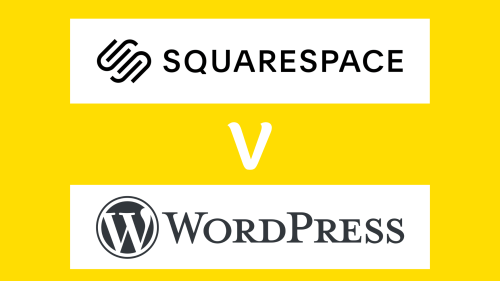
Squarespace v WordPress: which works better for small businesses?
Thinking Squarespace v WordPress? Let’s delve deeper into the pros and cons of each platform to help you find the perfect fit website for your small business.
1 Squarespace: where elegance meets functionality
Squarespace is renowned for its elegant designs and integrated features, making it an attractive choice for businesses seeking a polished online presence.
Pros:
- Quality of design: Squarespace’s templates offer an elegant aesthetic for your brand. If your business relies on a visually appealing online presence, Squarespace’s design quality is a major plus.
- Integrated features: Squarespace simplifies website management by allowing you to handle multiple aspects, including e-commerce and blogging, within a single platform. This integration streamlines your operations.
- All-in-one solution: Squarespace bundles hosting, security, maintenance, and domain name options, providing an all-inclusive package for your website needs.
Cons:
- Limited customization: while Squarespace excels in aesthetics, customization options are somewhat limited. If you have a highly specific design vision that doesn’t align with Squarespace’s templates, you may feel constrained.
- Learning curve: Squarespace may not be the best choice for absolute beginners. It takes time to become proficient in editing the design, changing settings, and arranging website elements to your liking.
- Cost: Squarespace’s convenience and design quality come at a price. Additional features, such as advanced e-commerce functionality, can significantly increase the overall cost.
2 WordPress: versatility meets possibility
WordPress, the most popular platform, offers flexibility and endless possibilities for every type of small business.
Before we delve into the nitty-gritty of Squarespace vs. WordPress, let’s clear up a common source of confusion: the difference between WordPress.org and WordPress.com:
- WordPress.org empowers you with open-source software, which you can download and set up on your own web hosting server. This version of WordPress offers total control and flexibility, but does need some technical knowledge.
- WordPress.com, a hosted platform where WordPress takes care of the hosting for you. It’s more user-friendly and requiring less technical know-how. However, it comes with certain limitations, particularly when it comes to themes and plugins.
Here, where we’re comparing the pros and cons of Squarespace v WordPress, we’re focussing on WordPress.org.
Pros:
- SEO excellence: WordPress consistently ranks as the best platform for search engine optimization (SEO), making it the top choice if you want your site to perform well in search engine results.
- Flexibility and scalability: WordPress suits a wide range of website types, from simple blogs to complex e-commerce sites, and is easy to scale as your business grows.
- Plugin variety: WordPress’s open-source nature means a vast array of plugins, both free and paid, is available. This vast selection provides endless options for adding the right functionality to your website.
Cons:
- Design complexity: WordPress’s rich feature options can make website design more complex for beginners, requiring extra effort to achieve a desired look and layout. However, with practice and tutorials, this challenge can be overcome.
- Maintenance demands: keeping WordPress, themes, and plugins up-to-date can be time-consuming. Failing to do so may expose your site to security risks or functional issues, making regular maintenance a crucial but somewhat tedious task.
- Content ownership: with WordPress, you have full ownership of your website’s content and data. Unlike some other platforms, you’re not tied to a specific hosting provider, ensuring that your content remains portable and secure.
Squarespace v WordPress: conclusion
In comparing Squarespace v WordPress, consider your business’s needs, your design preferences, and your willingness to invest time in learning and maintenance:
- If elegant design matters, go with Squarespace.
- If you want more functions and flexibility, go with WordPress.
Full transparency: why we love WordPress
We use WordPress for all our websites. Why? Because we can tailor it to fit small businesses exactly. It does require maintenance, and there is a learning curve – but we do all that for you.
Because we can code everything to work more simply, we offer a better experience – ideal for anyone who wants a versatile website without any techie headaches or needing any design insights.
Category: Demystifying Websites, Small Businesses
